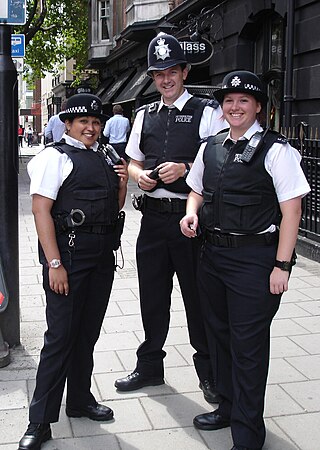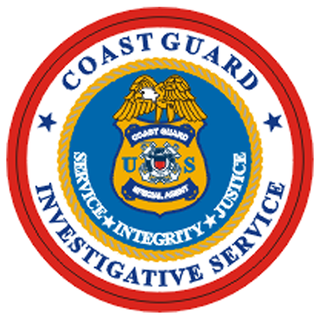Related Research Articles

Counterterrorism, also known as anti-terrorism, relates to the practices, military tactics, techniques, and strategies that governments, law enforcement, businesses, and intelligence agencies use to combat or eliminate terrorism.

The Security Service, also known as MI5, is the United Kingdom's domestic counter-intelligence and security agency and is part of its intelligence machinery alongside the Secret Intelligence Service (MI6), Government Communications Headquarters (GCHQ), and Defence Intelligence (DI). MI5 is directed by the Joint Intelligence Committee (JIC), and the service is bound by the Security Service Act 1989. The service is directed to protect British parliamentary democracy and economic interests and to counter terrorism and espionage within the United Kingdom (UK).

Law enforcement in the United Kingdom is organised separately in each of the legal systems of the United Kingdom: England and Wales, Scotland, and Northern Ireland. Most law enforcement duties are carried out by those who hold the office of police constable of a territorial police force.
The Serious Organised Crime Agency (SOCA) was a non-departmental public body of the Government of the United Kingdom which existed from 1 April 2006 until 7 October 2013. SOCA was a national law enforcement agency with Home Office sponsorship, established as a body corporate under Section 1 of the Serious Organised Crime and Police Act 2005. It operated within the United Kingdom and collaborated with many foreign law enforcement and intelligence agencies.

Europol, officially the European Union Agency for Law Enforcement Cooperation, is the law enforcement agency of the European Union (EU). Established in 1998, it is based in The Hague, Netherlands, and serves as the central hub for coordinating criminal intelligence and supporting the EU's member states in their efforts to combat various forms of serious and organized crime, as well as terrorism.
The Association of Chief Police Officers of England, Wales and Northern Ireland (ACPO) was a not-for-profit private limited company that for many years led the development of policing practices in England, Wales, and Northern Ireland. Established in 1948, ACPO provided a forum for chief police officers to share ideas and coordinate their strategic operational responses, and advised government in matters such as terrorist attacks and civil emergencies. ACPO coordinated national police operations, major investigations, cross-border policing, and joint law enforcement. ACPO designated Senior Investigative Officers for major investigations and appointed officers to head ACPO units specialising in various areas of policing and crime reduction.

The Coast Guard Investigative Service (CGIS) is a division of the United States Coast Guard that investigates crimes where the U.S. Coast Guard has an interest. It is composed of civilian (GS-1811), active duty, reserve enlisted, and warrant officer special agents.
The Australian Intelligence Community (AIC) and the National Intelligence Community (NIC) or National Security Community of the Australian Government are the collectives of statutory intelligence agencies, policy departments, and other government agencies concerned with protecting and advancing the national security and national interests of the Commonwealth of Australia. The intelligence and security agencies of the Australian Government have evolved since the Second World War and the Cold War and saw transformation and expansion during the Global War on Terrorism with military deployments in Afghanistan, Iraq and against ISIS in Syria. Key international and national security issues for the Australian Intelligence Community include terrorism and violent extremism, cybersecurity, transnational crime, the rise of China, and Pacific regional security.
The Special Detective Unit (SDU) is the main domestic security agency of the Garda Síochána, the national police force of Ireland, under the aegis of the Crime & Security Branch (CSB). It is the primary counter-terrorism and counter-espionage investigative unit within the state. The Special Detective Unit superseded the Special Branch, which itself replaced the older Criminal Investigation Department (CID), which was founded in 1921. They work in conjunction with the Defence Forces Directorate of Military Intelligence (J2) – Ireland's national intelligence service – on internal matters. The unit's headquarters are in Harcourt Street, Dublin City.
The counter-terrorism page primarily deals with special police or military organizations that carry out arrest or direct combat with terrorists. This page deals with the other aspects of counter-terrorism:

In many countries, particularly those with a federal system of government, there may be several law enforcement agencies, police or police-like organizations, each serving different levels of government and enforcing different subsets of the applicable law.
A specialist law enforcement agency is a law enforcement agency which specialises in the types of laws it enforces, or types of activities it undertakes, or geography it enforces laws in, or these in combination.

The National Crime Agency (NCA) is a national law enforcement agency in the United Kingdom. It is the UK's lead agency against organised crime; human, weapon and drug trafficking; cybercrime; and economic crime that goes across regional and international borders, but it can be tasked to investigate any crime. The NCA has a strategic role as part of which it looks at serious crime in aggregate across the UK, especially analysing how organised criminals are operating and how they can be disrupted. To do this, it works closely with regional organised crime units (ROCUs), local police forces, and other government departments and agencies.

Counter Terrorism Policing is the national collaboration of police forces working to prevent, deter, and investigate terrorism in the United Kingdom.
Plural policing is a term that describes the idea that the police cannot work on their own as the sole agency to deal with the wide range of issues that they are expected to deal with in the present day. It draws on the idea of a mixed economy and so is also sometimes referred to as mixed economy policing. Plural policing relates to the wide range of other agencies, both public, private, and charity that work towards the generic aim of law enforcement. The idea of plural policing was first considered in an article by Les Johnson in 1993 entitled "Privatisation and Protection: Spatial and Sectoral Ideologies in British Policing and Crime Prevention" in the Modern Law Review. Ten years later, he expanded on this initial work in a further article.
References
- List of UK police forces – Police.uk